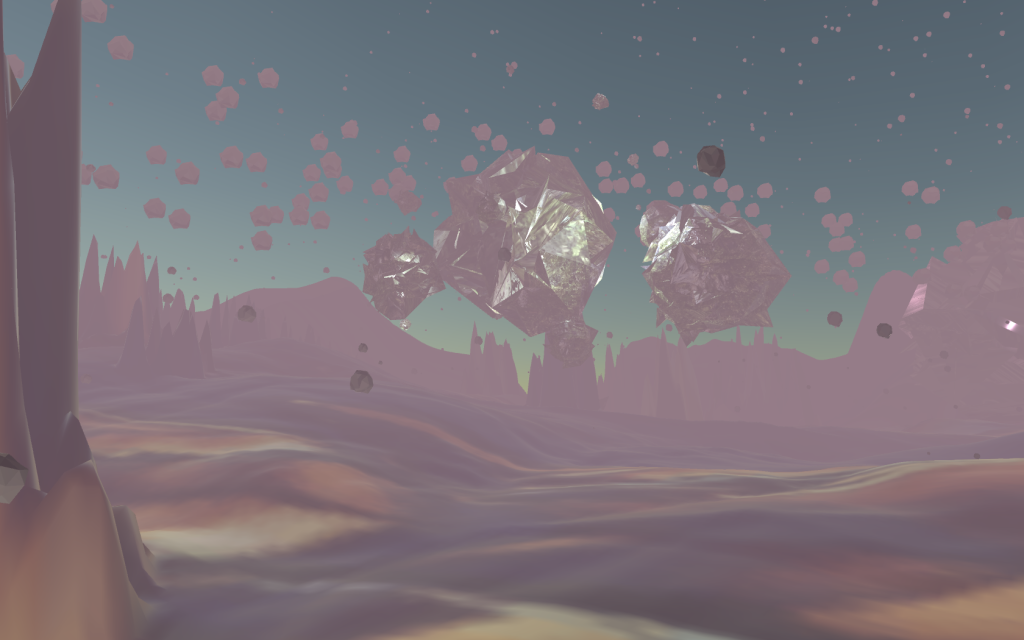
Ondřej Throň is a game developer who seems to be mainly interested in exploring the possibilities of narration and storytelling over the means of interactivity. The games that they created over the last five years are connected not only by common themes (among politics, mental health, social inequality, and the bleakness of a world shaped by commodification), but also by their playing with and occasional bursting of medium-limits and standards – all of them exist on the boundary towards the interactive fiction and often show a high amount of literacy; they are clearly more on the „art“-side of gaming, and often leave much room for interpretation.
My Strange Plane is a Thing Bodys Moves through is a walking simulator. You roam through a world beautifully saturated but harshly shaped and quite limited in its boundaries, which is inhabited by persons that are abstract forms composed from natural materials. They reflect mostly on themselves or complain to you about their insecurities and the hardships of their life. One of them will complain about the place, formulating their wish to jump off – you are free to do so, but will always be thrown back onto it. The soundtrack, consisting of ambient made from spaceflight field recordings establishes the link back to our reality.
On a Shore, One Wishful Transcendence is an interactive poem, made with Twine, and it uses the medium most trenchantly. Its short, melancholic, powerful – and absolute unique in its style. The game has a materiality (this doesn’t quite cut it, Dinglichkeit is the really needed term for it) within the field of what it wants to be that none of the many pitfalls of interactive fiction come to strike. Strongly recommended.
Millenial Tarot depicts the attempt to find orientation and transcendence in a world were environment, culture, and the human condition itself are reshaped through their reification – the game itself is no exception, as it is tailored around the needs of video gaming in a time were most small games are booted only a single time by most players, if at all, and are judged mostly by their appeal on screenshots and from snippets on gaming streams – after starting it you can pull and flip your cards only a single time, and the game stays as opaque about their meaning as about its own message.
Cherry-colored Dream is „adapted from an exhibition“ – and, judging from comparing the game to the pictures and the text on the linked page, this means that it is basically a video game based on the impressions from this exhibition – the result is as artsy and incredible as this sounds. Again, it is an interactive fiction – but interestingly it uses to Unity-Engine to weave in „walking-simulator“-elements and effects that can’t be created with Twine (at least to my knowledge). The game is clearly political, but the use of metaphors and symbols leaves room for interpretation.
The same can’t be said about Memorial: 2020. The game is a direct statement, and the gameplay is merely used to break the wall with a big finger pointing onto the constructed player who tries to escape from reality by ignoring it. In the end, the game will start to attack you with glitch effects, flashes, and by throwing your avatar to hell. Or does it? You are actually free to move where you want all the time.
My Pandemic Table deals with Corona and its effects in a much more personal way. The game consists of sections, using different principles and switches the genre and even the medium. The gameplay elements are not used for their own sake, but are set as a mean of communication: the experiences like the sorting of everyday live within a threatening crisis are realized through a search-and-find game, later we enter the invisible protagonists inner world over a desktop simulation (a genre seemingly rising in popularity nowadays; just stumbled over it a few weeks ago; the developer wrote a review to Hyperspace Outlaw).
Reality On/Off is the first game released by the developer, and less refined than the later works: The technical realization is raw, and the message much more direct. The usage of gameplay as a mean of communication is already there, this time it is used to typify the shared objectives, dreams, and fallacies of modern societies (this could be, at least indirect, be informed by the thoughts of Émile Durkheim) – but the final scene can be read as a scrutinization of these shared ideals and goals.
All of the mentioned games are available for Windows and Mac or can be played within the Browser. I was able to run them all without encountering any problems using OpenSuse Leap and Firefox.
On their website and Itch profile, Ondřej Throň shares not only more games but also written texts, information about art- and zine projects, and links to further works (many of them in Czech, but somewhat accessible via google translate), and a link to a queer game dev collective. They recently joined the underground game „jam“ on Itch, and their games are a splendid and welcome addition there – I highly recommend to check them out!
I just found your blog through the comment you left on Carcosa’s Itch.io page, and I’ve really liked what I’ve seen! I’m not familiar with Throň’s work but am looking forward into checking it out. Thanks for the work you do to highlight and curate these games <3
Hi Joe.
Glad you enjoy my blog! Have fun playing all these wonderful games 😀